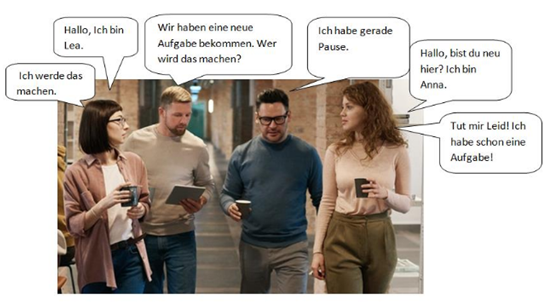In this lesson, you will discover everything important to know about the German auxiliary verbs sein, haben, and werden, what is the meaning of them, and when and how we use them.
Thank you for reading this post, don't forget to subscribe!CONTENT
The auxiliary verbs haben and sein
Haben or sein in the perfect?
The meaning of the verb haben
The meaning of the verb Sein
The auxiliary verb werden
The meaning of the verb Werden
Worden
The auxiliary verbs haben and sein
These two verbs are used to form the Perfect Tense in German.
Approximately 70% of verbs go with haben (to have), and the rest go with sein (to be).
If you are not sure whether a verb takes haben or sein, there are easy rules to follow. As you are going to use the verbs to have and to be for the perfect tense frequently, here is a reminder of these two important verbs.
| haben | |
| ich habe I have du hast (informal) you have Sie haben (formal) you have er,sie,es hat he, she, it has | wir rhaben we have ihr habt (informal) you have Sie haben (formal) you have sie haben they have |
| sein | |
| ich bin I am du bist (informal) you are Sie sind (formal) you are er,sie,es ist he,she,it is | wir sind we are ihr seid (informal) you are Sie sind(formal) you are sie sind they are |
Haben or sein in the perfect tense?
Whether the perfect tenses are formed with haben or sein depends on the meaning of the verb. Most verbs, including all TRANSITIVE VERBS and REFLEXIVE VERBS, form their perfect tenses with haben, but the following groups of verbs use sein.
▪ intransitive verbs of motion
Ich bin nach London gefahren. – I have gone to London.
Er ist gerade aus dem Büro gegangen. – He has just gone out of the office.
▪ intransitive verbs expressing a change of state:
Die Kinder sind schon eingeschlafen. -The children have already fallen asleep.
Das Licht ist ausgegangen. – The light has gone out.
▪ Most verbs meaning ‘happen’, ‘succeed’, ‘fail’
Was ist hier passiert? – What has happened here?
Der Plan war fehlgeschlagen. – The plan had failed.
▪ the verbs sein and bleiben:
Er ist in der Bäckerei gewesen.- He has been to the bakery.
Wir waren zu Hause geblieben. – We had stayed at home.
Some German verbs can be used with either “sein” or “haben,” and their meanings can change depending on which auxiliary verb is used.
The most common example is the verb “fahren.” When “fahren” is used intransitively (indicating motion) and takes “sein,” it means “to go (by transport)” or “to travel.” However, when it is used transitively (meaning it has a direct object) with “haben,” it means “to drive” or “to bring/take someone somewhere.”
For example:
Er ist mit dem Rad zu rArbeit gefahren. – He went by bike to work
Ich bin im Mai nach London gefahren. – I traveled to London in Mai.
Er hat seinen neuen Mercedes gefahren. – He drove his new Mercedes.
Wir haben ihn ins Krankenhaus gefahren. – We brought him to the hospital.
It’s important to memorize the present tense forms of the verbs “haben” and “sein,” just like a poem.
My students often resist when I suggest they need to memorize something. I understand that this task can be challenging. To make it more appealing, I prefer to use the term “memorize,” as it has a more positive and encouraging connotation, which helps avoid the discouraging idea of simply learning by rote. There are also memory techniques that can assist with this process.
The meaning of the verb haben
Haben can have more uses in the sentence. It can be used as:
- regular verb and then it means to have.
For example:
Du hast viele Bücher. – You have many books.
Haben Sie Zeit? – Do you have time?
Sie hat blaue Augen. – She has blue eyes.
- auxiliary verb and then it does not have the meaning on its own, it helps to make the Past Simple Tense.
For example:
Ich habe gestern Deutsch gelernt. – I studied German yesterday.
Wir haben in Südafrika gelebt. – We lived in South Africa.
Er hat letzte Woche seine Oma besucht. – He visited his grandma last week.
There is a detailed explanation in the lesson The Perfect Tense in German on how and when to use haben.
- All transitive verbs (verbs that require an object in the accusative case) takeshabenas their auxiliary in the perfect tense, all reflexive verbs and modal verbs as well.
- The Past Simple Tense of haben (=hatte) forms the Past Perfect Tense (Plusquamperfect)
For example:
Ich hatte gelernt.
Wir hatten gekauft. - In the spoken language, the Paste Tense of haben is used rather than the Perfect Tense.
For example:
Er hatte viele Bücher. ( rather than: Er hat viele Bücher gehabt.)
Ich hatte keine Zeit. ( rather than: Ich habe keine Zeitge habt.)
Click on:
Grammar Contents
The meaning of the verb sein
The verb “sein” has multiple uses in sentences.
1. As a regular verb, it means “to be.” The conjugation for different subjects is as follows:
– ich bin (I am) – wir sind (we are)
– du bist (you are) – ihr seid (you all are)
– er, sie, es ist (he, she, it is) – sie sind (they are)
For example:
Ich bin Mia. – I am Mia.
Wer bist du? – Who are you?
Das ist Lena. – That is Lena.
Sie ist toll. – She is awesome.
2. As an auxiliary verb, “sein” is used alongside “haben” to form the Perfect Tense. More details on this can be found in the lesson on the Present Perfect in German.
For example:
Ich bin gekommen. – I have come.
Er ist geschwommen. – He has swum.
3. In the Perfect Tense, verbs of motion are used: gehen (go), kommen (come), fliegen (fly), schwimmen (swim), and verbs that denote a change of state: einschlafen (fall asleep), aufstehen (get up)…
The Past Tense of verb sein is used for making the Past Perfect Tense (Plusquamperfect).
For example:
Ich war gegangen. – I had gone.
Er war gekommen. – He had come.
The auxiliary verb werden
The auxiliary verb werden behaves just like other auxiliary verbs such as “haben” (to have) and “sein” (to be). Werden means to become and is a very important verb in German
| werden | |
| ich werdeI become du wirst (informal) you become Sie werden (formal) you become er,sie,es wird he,she,it becomes | wir werden we become ihr werdet (informal) you become Sie (formal) werden you become sie werden they become |
The meaning of the verb Werden
Werden can be used as:
- regular verb and then it means to become/turn/get.
For example:
Sie wird Mutter. – She will become a mother.
Erwirdschnellmüde. – He quickly gets tired/He quickly becomes tired.
Sie wird bald 30. – She will soon be 30./She will soon turn 30 years old.
Es wird kalt. – It getts cold.
- auxiliary verb and then it has no meaning on its own.
- It is used to form:
a. The Future Tense (Futur I)
The Present Tense of the verb werden + infinitive of the main verb.
For example:
Ich werde nach Rom fahren. – I will travel to Rome.
You can find more information on this topic here: The Future Tense (Futur I)
b. Passive Voice (Passiv)
Passive voice is used to emphasize the action or state.
For example:
Der Patient wird operiert.- The patient is undergoing a surgery.
To make a passive sentence, you need the verb werden and another verb in Participle of Present Perfect (gekocht, gefragt, gegessen etc).
Here are a few sentences in passive:
Das Auto wird repariert. – The car is being repaired.
Das Auto wird repariert. – The cake is being made.
In Genf wird Französisch gesprochen. – French is spoken in Geneva.
If you want to know how to make the passive voice in German click on German Passive
Worden
Some of you have already come across the expressions worden and geworden and you wonder what is the difference. Here is the explanation😀.
Geworden is the perfect participle of the verb werden, and it is used for making the Present Perfect.
For example:
Ich bin müde geworden.
Ich bin Arzt geworden.
In the perfect tenses of the passive voice, the form ‘worden’, without the prefix ‘ge-‘, is used as the past participle of ‘werden’.
For example:
Sie ist falsch verstanden worden.
Er ist von seinem Chef gelobt worden.
See more:
Bis zum nächsten Mal!


